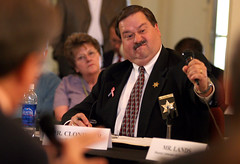IRS Commissioner Doug Shulman Not Really Grilled by Subcommittee
by Gary Therkildsen*, 5/20/2009

Yesterday morning, I attended a House Appropriations subcommittee hearing to listen to Douglas H. Shulman, Commissioner of the Internal Revenue Service (IRS), provide testimony on the funds Congress will supply to his agency this upcoming fiscal year. I had hoped that subcommittee members would question Shulman over the deteriorating quality of the agency's audits over the past few years – especially those performed on corporations and wealthy individuals – and the insufficient level of services provided to those who claim the overly complicated Earned Income Tax Credit (EITC). Despite the absence of any of these inquires, there were two interesting exchanges during the hearing.
The first came in response to a question on private tax collection from Representative Allen Boyd (D-FL). Boyd asked for an explanation as to why the IRS recently discontinued the use of private tax collectors to collect taxes owed by citizens – a move advocated for and applauded by OMB Watch. Shulman claimed that IRS performed an internal review to examine the efficiency of private tax collectors versus IRS employees collecting taxes several years after initiating the outsourcing program. What IRS found was that its own tax collectors are three times more efficient at collecting taxes than private tax collectors.
Additionally, the IRS does not grant private tax collectors the flexibility that federal tax collectors have, so they cannot work out repayment plans or deferral of tax agreements – a necessary tool, especially during an economic downturn. Lastly, Shulman emphasized that IRS did not cancel outsourcing due to the supposed abuse of citizens by private tax collectors. Shulman maintained that the issue became politically polarized over the debate between Democrats and Republicans on the merits of private tax collection.
The second exchange came in response to a question from Subcommittee Chairman José E. Serrano (D-NY) regarding a claimed decrease in the audit rate of corporations and wealthy individuals over the past few years. Shulman bluntly challenged Serrano's assertion that audits had gone down and claimed that a report by the Transactional Records Access Clearinghouse (TRAC) at Syracuse University cited by Serrano was flat out wrong. Shulman claimed that the TRAC statistics were "unfair" because they were calculating the percentage of the total audits done over the total number of corporations eligible for review, rather than just providing the total number of audits done in a year.
In fact, Shulman claimed that, while the number of audits for corporations has dipped slightly over the past few years, audits overall have doubled over the past five years. It's a little strange that Shulman is complaining about TRAC's use of coverage rates to evaluate IRS performance when Shulman himself cited coverage rate statistics to represent his agency in his testimony to Congress. What's more, just looking at the number of audits performed is a bit shortsighted since it does not account for IRS's responsibility for collecting taxes from ever-greater numbers of people and corporations each year.
Written Testimony: Douglas Shulman of Internal Revenue
Image by Flickr user foreversouls used under a Creative Commons license.



